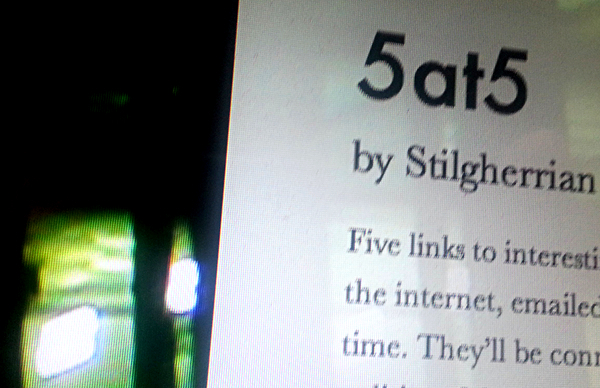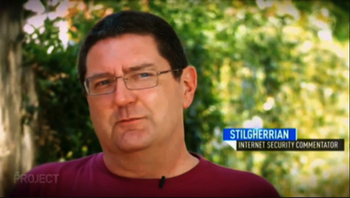 I come across a lot of fascinating stuff in the course of my alleged media work. It’s stuff worth sharing more widely. Back in December, I decided that I’d start sending out a daily email linking to the best. That email launches tomorrow, Monday 3 February.
I come across a lot of fascinating stuff in the course of my alleged media work. It’s stuff worth sharing more widely. Back in December, I decided that I’d start sending out a daily email linking to the best. That email launches tomorrow, Monday 3 February.
It’s called 5at5, and it’ll bring you five items every weekday at around 5pm Sydney time.
They’ll be connected to [my] interests in some way — the politics of the internet and how technology is changing power relationships at every level of society, security and surveillance, military technology and history, language, journalism and human nature. And more.
I was amused to see Alexis Madrigal, technology editor at The Atlantic, launch his own daily email recently, 5 Intriguing Things. Five is the magic number, it seems.
I’ve chosen to use the same platform at Madrigal, TinyLetter, which is a subsidiary of email marketing platform MailChimp. Why? Mostly because it’s free. TinyLetter is limited to 3000 subscribers, but I’ll worry about that when it happens.
So now you’re going to click through to subscribe, right? Good puppy. Smart puppy.

 On Tuesday, news reached us that two men connected with the digital currency Bitcoin had been
On Tuesday, news reached us that two men connected with the digital currency Bitcoin had been  On Friday 13 December I recorded some grabs for the Channel TEN program The Project, which were used that night in a story about Google’s idea of putting microphones in your house so that their “digital assistant” software could figure out how it could help you next.
On Friday 13 December I recorded some grabs for the Channel TEN program The Project, which were used that night in a story about Google’s idea of putting microphones in your house so that their “digital assistant” software could figure out how it could help you next.